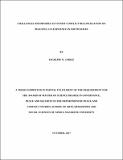| dc.description.abstract | This research was carried out to investigate the challenges and prospects to post-conflict reconciliation on peaceful co-existence in South Sudan. The study was guided by the following objectives; investigating the role of political leadership in post conflict reconciliation and peaceful co-existence in South Sudan, establishing the effectiveness of governance structures in promoting post-conflict reconciliation on peaceful co-existence in South Sudan, examining the relevance of the International Community efforts towards post conflict reconciliation and peaceful co-existence in South Sudan and investigating the challenges to peace and reconciliation in South Sudan. Additionally, the study specifically, sought to establish strategies for reconciliation in South Sudan, examined the place and influence of politics on reconciliation attempts in South Sudan and assessed the effects of governance systems on reconciliation attempts in South Sudan. The study was guided by two hypothesis; the challenges and prospects of post conflict reconciliation and peaceful co-existence in South Sudan are unique to South Sudan and the challenges and prospects of post conflict reconciliation and peaceful co-existence in South Sudan are not unique to South Sudan. Two theories were found applicable for this study namely the problem solving approach and the peace building theory. The study is of benefit to South Sudanese policy makers, researchers and the International Community broadly, in their effort to promote a just and lasting peace in South Sudan. The literature review was thematically organized around the research objectives. The research employed a descriptive research design that enhanced clarity and enabled everyone to be included in the study. The target population was 41,000 respondents. The researcher used stratified random sampling procedure to select a sample size of 203 respondents. Both questionnaires and interviews were used to collect data which was analyzed using statistical tools and presented using pie charts, tables and graphs. Qualitative data was analyzed using content analysis, while quantitative data was presented using descriptive statistics. The study found that progress has been made to establish the building block of effective political system. The study concludes that the governance systems in South Sudan are still extremely weak and this is a major hindrance to post conflict peace and reconciliation. The study also established that the International Community has not been effective in its role of mediation and supporting post conflict reconciliation on peaceful co-existence in South Sudan. There is need to foster transparency in aid allocation and for the International Community to adopt non-partisan approach and to establish effective and lasting relationships with the government of South Sudan. | en_US |

